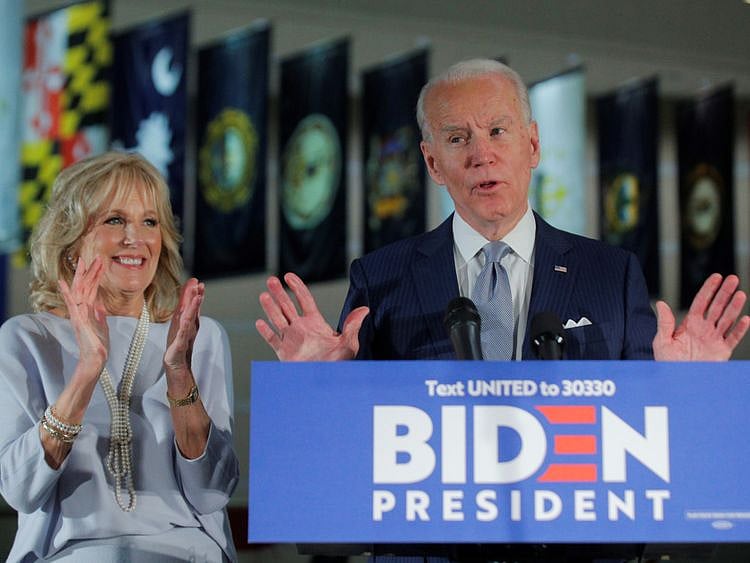Big wins help Joe Biden take commanding lead in US Democratic race
Sanders will have to win more than half the remaining delegates to catch up

Dubai: Just three weeks ago, about a dozen candidates in the US were at the forefront of campaigning to win the Democratic presidential nomination. Today, that race has whittled down to two contenders, with some analysts asking how soon one of them would concede.
The results from six states that went to the primaries on Tuesday showed former vice-president Joe Biden take a commanding lead in the nomination race, consolidating his position from a fumbling underdog to a likely party nominee. By sweeping aside Senator Bernie Sanders, Biden demonstrated that his successes on Super Tuesday were not just good fortune, but well fought victories with support from African Americans and white voters in suburban and rural areas.
Convincing victories for Biden
The former vice-president swept to convincing victories in Missouri, Mississippi, Idaho and, most importantly, Michigan. The state was the biggest prize of the night and is strategically important for both parties in the general election.
In a speech to supporters in Philadelphia, Biden sought to heal divisions in the party and sounded like a candidate ready to claim the nomination. “I want to thank Bernie Sanders and his supporters for their tireless energy and their passion,” Biden said. “Together we’ll defeat Donald Trump.”
It was the scope of victories that stood out for Biden on Tuesday. With 365 delegates up for grabs, the former vice-president was poised to build what could become an insurmountable advantage. If he wins with similarly large margins next week in delegate-rich Florida, where Sanders trails badly in polls, he may make it all but impossible for the senator to catch up.
In the primaries on Tuesday, Biden assembled a strong electoral coalition that combined his party’s most loyal constituencies - including African Americans, women and union members - with a new wave of moderate white voters who have aligned themselves with the Democrats as refugees from Trump’s Republican Party.
Biden, however, made little headway with the youngest and most liberal primary voters who remained steadfastly behind Sanders even as his national prospects have dimmed.
What next for Sanders?
The contests on Tuesday were Sanders’ best shot. Four years ago, he won four of the six states. Biden’s broad support means there are few remaining opportunities for Sanders to claim momentum and improve his standing. Michigan was the signature win of his 2016 bid. Four years ago, he won more than 70 per cent of the vote in caucuses in Washington and Idaho.
The problem for Sanders is the voters, not just the delegate mathematics. Sanders is nowhere near mathematical elimination, with the required 1,991 delegates still a long way away. More than half of all the pledged delegates have yet to be decided, so Biden can’t mathematically clinch the nomination until April 28 at the earliest. But the delegate math is getting daunting for Sanders. He trails Biden by 150 delegates, but will have to win more than 57 per cent of the remaining delegates to catch up - a difficult feat given the primary calendar over the next six weeks.
What happens next week?
Biden and Sanders face each other in a debate on Sunday, the first one-on-one faceoff of the campaign, but this time without a live audience due to coronavirus fears.
The next round of primaries in Florida, Ohio, Illinois and Arizona next week could determine whether the race between Biden and Sanders drags on or effectively ends.
Sanders took his primary battle with Hillary Clinton until June in 2016, just as Clinton did with Barack Obama in 2008. A shorter fight could prove a major advantage to Biden, allowing him to avoid the rigors of a primary fight and bank millions in cash that will be needed to confront Trump.
Endorsements play a big role
The Democratic Party has been rallying around Biden. Former competitors Pete Buttigieg, Amy Klobuchar, Kamala Harris, Cory Booker, Michael Bloomberg and Andrew Yang have endorsed him.
Massachusetts Senator Elizabeth Warren, who was Sanders’s rival for leader of the party’s progressive wing, ended her campaign on March 5 after failing to place higher than third in a primary or caucus. She’s said she’s not ready to endorse a candidate.
Yang, who endorsed Biden while analysing the results, said “the math says” the former vice-president is the presumptive nominee.
Coronavirus looms over race
The coronavirus outbreak is also looming over the race, and its long-term impact on the presidential campaigns is unclear. Sanders and Biden both cancelled planned rallies in Cleveland, Ohio, on Tuesday and said they were evaluating future events.
Trump said over the weekend that he would continue holding campaign rallies with thousands of supporters regardless of the threat of the virus. He planned an event in the Wisconsin Center, which holds thousands of people on March 19.
- with inputs from agencies
Sign up for the Daily Briefing
Get the latest news and updates straight to your inbox
Network Links
GN StoreDownload our app
© Al Nisr Publishing LLC 2026. All rights reserved.